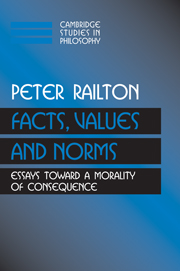Book contents
- Frontmatter
- Contents
- Foreword
- Part I Realism about Value and Morality
- Part II Normative Moral Theory
- 6 Alienation, Consequentialism, and the Demands of Morality (1984)
- 7 Locke, Stock, and Peril: Natural Property Rights, Pollution, and Risk (1985)
- 8 How Thinking about Character and Utilitarianism Might Lead to Rethinking the Character of Utilitarianism (1988)
- 9 Pluralism, Dilemma, and the Expression of Moral Conflict (1992, 2001)
- Part III The Authority of Ethics and Value – The Problem of Normativity
- Index
8 - How Thinking about Character and Utilitarianism Might Lead to Rethinking the Character of Utilitarianism (1988)
Published online by Cambridge University Press: 18 December 2009
- Frontmatter
- Contents
- Foreword
- Part I Realism about Value and Morality
- Part II Normative Moral Theory
- 6 Alienation, Consequentialism, and the Demands of Morality (1984)
- 7 Locke, Stock, and Peril: Natural Property Rights, Pollution, and Risk (1985)
- 8 How Thinking about Character and Utilitarianism Might Lead to Rethinking the Character of Utilitarianism (1988)
- 9 Pluralism, Dilemma, and the Expression of Moral Conflict (1992, 2001)
- Part III The Authority of Ethics and Value – The Problem of Normativity
- Index
Summary
“One cannot properly judge actions by their outcomes alone. The motive from which an act is performed is independently important, and makes a distinctive contribution to moral assessment not only of the actor, but of the action. Moreover, if morality is to achieve a secure place in individual lives and social practices, it is necessary that agents develop firm characters to guide their choices and to provide others with a stable basis of expectation and trust. Any sensible moral theory therefore must give a central role to the encouragement and possession of virtuous character.”
When such thoughts are heard, can it be more than a moment before a condemnation of act utilitarianism follows? Still, many critics of act utilitarianism remain drawn to what I will call the guiding utilitarian idea, namely, that the final ground of moral assessment – including assessment of character – must lie in effects on people's well-being. For such critics, a favored strategy has been to turn to indirect forms of utilitarianism, such as rule utilitarianism. And indeed, moral philosophers in general appear increasingly to be convinced that if utilitarianism is to be defensible, it will be in an indirect form.
Perhaps, then, with these remarks about the importance of character fresh in our minds and with some sympathy for the guiding utilitarian idea alive in our hearts, we should consider the possibility of formulating an indirect utilitarianism worthy of the name character utilitarianism. And that is indeed what I propose to do, by considering two forms character utilitarianism might take.
Information
- Type
- Chapter
- Information
- Facts, Values, and NormsEssays toward a Morality of Consequence, pp. 226 - 248Publisher: Cambridge University PressPrint publication year: 2003
